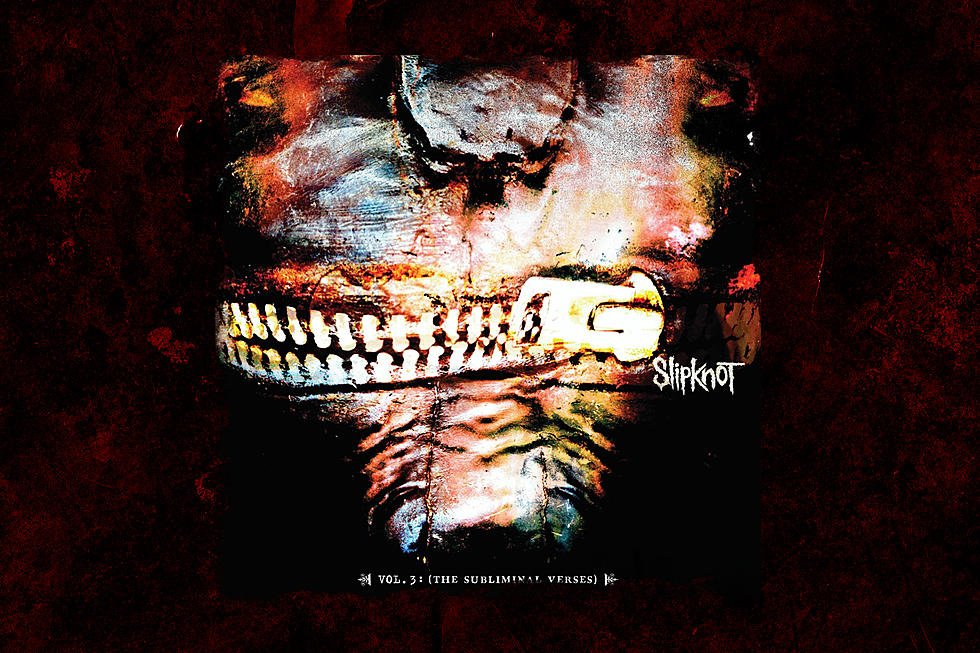
19 Years Ago – Slipknot Overcome Internal Strife to Unleash ‘Vol. 3: (The Subliminal Verses)’
In the blackened world of Slipknot, dysfunction and turbulence have often coincided with artistic triumph, as is the case with Vol. 3: The Subliminal Verses, an album largely composed by Paul Gray (who would pass away in 2010) and drummer Joey Jordison (who would be ousted from the band in 2013.)
As with other great albums by bands in turmoil, such as the Rolling Stones’ Exile on Main Street, Fleetwood Mac’s Rumours and Guns N’ Roses Appetite for Destruction, Slipknot’s trials and tribulations shine through. Pain, self-loathing and the lure of addiction cut through each toxic groove, from the surreal guitar-layers and psychedelic strains of opener “Prelude 3.0” to the surging riffs, hammering tribal beats and the screams of “I am the damaged one!” on the second track “The Blister Exists.” Two songs in and Slipknot have presented a bloodied microcosm of the rest of the album.
Slipknot, "The Blister Exists"
Then they rip off the scabs with the commercial clamor of “Duality,” the even more melodic constructions of “Vermillion” and “Vermillion 2,” the industrial-tinged chaos of “Pulse of the Maggots” and the schizophrenic bombast/heart on sleeve lament “The Nameless.”
Slipknot, "Duality"
From the moment the members of Slipknot got together in Los Angeles to start working on Vol. 3, dysfunction was the order of the day. Gray had lots of ideas for songs, but was so impaired by heroin addiction he could barely record them. Vocalist Corey Taylor was a raging alcoholic and refused to enter the studio for weeks.
When ex-drummer Joey Jordison showed up and discovered that no one was ready to work, he lost himself in his own chemical euphoria. The remaining band members were dealing with their own baggage, leaving Gray and Jordison to work in shifts with the input of guitarists Jim Root and Mick Thomsom. When Taylor finally showed up it took him ages to clear his bloated head.
“I pushed everybody away,” he says. "I would drink all day and then go to the bar at night. I was the quintessential lead singer. You were gonna cater to my ego and tell me everything was great. And that’s so not who I am. Honestly. I never wanted to be like that. I would keep a bottle of Jack next to my fucking bed every day. Instead of figuring out why I was upset [because of a soured relationship with my ex-wife], I just drowned in it.”
Watching his bandmates avoiding one another and falling apart before his eyes was agonizing for Gray, who, despite his addiction, was eager to record a new album. The fact that everyone else seemed content to avoid their obligations and revel in oblivion made the bassist despondent.
“I was severely depressed because, after Iowa, we were sick of each other and there was so much hate going around,” he said in 2008. “I didn’t feel that way. I wasn’t mad at anybody, but everyone else was. And I kind of felt like, ‘Oh, fuck, my family is moving away from each other. I thought the band might break up.’ I’d hear someone say, ‘Fuck it, I’m quitting. I’m out,’ and that would fuckin’ freak me out.”
It wasn’t idle banter. No one got along, and pretty much nobody cared. It took percussionist Shawn “Clown” Crahan, who founded Slipknot with Gray, to rally the troops.
“We were in the studio three months and I hadn’t laid down a stitch of vocals that I could call good,” Taylor says. “I was about quit the band. I was on the phone buying a plane ticket and then Clown talked me down. He said, ‘Look, we’re gonna figure this out.’ Clown has always been kind of a father figure for me in a weird way even though we’re only four years apart.”
Slipknot, "Before I Forget"
Gradually, Clown was able to get through to his band mates by appealing to them as friends. Instead of pressuring anyone to write or record he strived to gain their trust and help them understand they were all members of a team that was temporarily broken, but could be reconstructed. With the help of producer Rick Rubin, he urged members who hadn’t talked in months to open the lines of communication and reminded everyone about some of the great moments that they had shared.
“Since we were rebuilding friendships, it was real easy to rebuild the innovation of our music,” Crahan says. “We took some chances, but it wasn’t like someone was guiding us. These are things we’d been wanting to do. Listen to that f---ing record. It’s spiritual. I love it. The best way to describe it is salvation and rejoicing in working again. It’s like being an alcoholic and saying, ‘I need to get help.’ We knew we were gonna rebuild and we did.”
Once the Knot got their creative engine cranking, Thomson and Root created a combination of brutal thrash and skewed alt-metal riffs as well as a new (for them) array of textural passages that gave them a more progressive and musically accomplished sound. While Thomson agrees that Slipknot wanted to expand their musical boundaries, he says that’s always the case.
“People always say, ‘Oh, that record was so different. Did you want to do something more experimental or more melodic?’ he says. “No, shit just happens, and at that point that’s what came out. There’s no rules. Our musical scope is very vast. We’re all musicians. We can pretty much play everything. Can we play Texas blues? Of course we can. Am I gonna put that on the record? Fuck no, it doesn’t fit.”
Slipknot, "Vermillion, Pt. 2"
For a while, producer Rick Rubin and engineer Greg Fidelman kept their distance and allowed the Knot to find their own groove. When the band was finally ready to start recording Fidelman took their finished tracks to Rubin, who listened and then and send them back with comments.
“A lot of the guys in the band say Rick was unavailable,” Root says. “And, yeah, he takes on a lot of projects at one time, but he also does things that are beneficial. He had us retrack things that needed work. He’s kind of like Big Brother up on the hill. Even though he wasn’t there physically every day, he was there and he had some great suggestions.”
When Slipknot tweaked the tracks and applied some of Rubin’s ideas, Vol. 3: The Subliminal Verses started to take shape. In the end, Rubin trimmed the fat and brought out the band’s most enraged, despondent and inspired moments. It’s debatable if another producer could have done the same, but there’s no question that Vol. 3: The Subliminal Verses still holds up.
“It’s one of my favorite records we’ve done,” Root says. “We tried some things that were different and took some chances and they came out great. I was hoping we’d be able to evolve from that, and I’m not sure that we have.”
Loudwire contributor Jon Wiederhorn is the author of Raising Hell: Backstage Tales From the Lives of Metal Legends, co-author of Louder Than Hell: The Definitive Oral History of Metal, as well as the co-author of Scott Ian’s autobiography, I’m the Man: The Story of That Guy From Anthrax, and Al Jourgensen’s autobiography, Ministry: The Lost Gospels According to Al Jourgensen and the Agnostic Front book My Riot! Grit, Guts and Glory.
The 66 Best Metal Songs of the 21st Century
More From Loudwire









